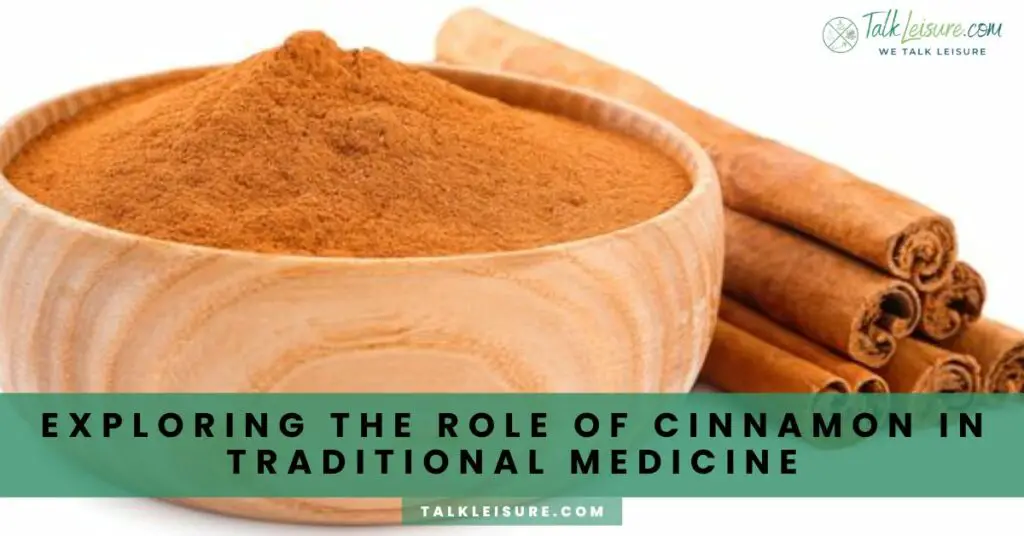Come on let’s uncover the secrets of cinnamon’s role in traditional medicine and harness its natural benefits for improved well-being.
Cinnamon is an aromatic spice that has been used in traditional medicine for centuries.
It is derived from the inner bark of trees belonging to the Cinnamomum genus.
In addition to its culinary uses, cinnamon has been known for its medicinal properties and is still utilized in various forms in traditional medicine.
History and Significance of Cinnamon in Traditional Medicine
Cinnamon has a rich history in traditional medicine, dating back to ancient Egypt and China.
It was highly valued for its healing properties and was used to treat ailments such as digestive disorders, respiratory issues, and menstrual problems.
The Egyptians also used cinnamon in the embalming process due to its antimicrobial properties.
In Ayurvedic medicine, a traditional system of medicine in India, cinnamon is considered a warming herb that can balance the body’s energy, improve digestion, and enhance circulation.
It is also believed to have antioxidant and anti-inflammatory effects.
Cinnamon and Heart Health: What Does Research Say?
Different Forms of Cinnamon Used in Traditional Medicine
Cinnamon is available in various forms, each with its unique benefits.
The most common forms of cinnamon used in traditional medicine include:
Cinnamon powder: This is made by grinding dried cinnamon bark into a fine powder. It is often used in teas, herbal remedies, and culinary preparations.
Cinnamon essential oil: The oil is extracted from cinnamon bark and has potent medicinal properties. It is often used in aromatherapy, massage oils, and topical applications for its antimicrobial and anti-inflammatory effects.
Cinnamon supplements: These are available in capsule or tablet form and are commonly used to promote digestive health, regulate blood sugar levels, and support weight loss.
Cinnamon tea: Steeping cinnamon sticks or powder in hot water creates a flavorful tea that is enjoyed for its soothing and warming effects. It is commonly used to relieve cold symptoms and improve digestion.
Nutritional Profile of Cinnamon
Cinnamon not only adds a delicious flavor to our dishes, but it also offers a range of health benefits thanks to its nutritional content.
Let’s take a closer look at the key nutrients found in cinnamon and the health benefits they provide.
Key Nutrients Found in Cinnamon
Fiber: Cinnamon is rich in dietary fiber, which aids in digestion and helps regulate blood sugar levels.
Vitamins and minerals: Cinnamon contains small amounts of various vitamins and minerals, including calcium, iron, and vitamin K.
Health benefits Derived from the Nutritional Content of Cinnamon
Improved digestion: The fiber in cinnamon promotes healthy digestion and can help relieve digestive issues such as bloating and constipation.
Blood sugar regulation: Cinnamon has been shown to help regulate blood sugar levels, which is beneficial for individuals with diabetes or insulin resistance.-
Anti-inflammatory effects: The antioxidants found in cinnamon have anti-inflammatory properties, which may help reduce inflammation in the body and lower the risk of chronic diseases.
Antioxidant Properties of Cinnamon

Cinnamon not only adds a delicious flavor to our dishes, but it also offers a range of health benefits thanks to its nutritional content.
Let’s take a closer look at the key nutrients found in cinnamon and the health benefits they provide.
Health Benefits Derived from the Nutritional Content of Cinnamon
Improved digestion: The fiber in cinnamon promotes healthy digestion and can help relieve digestive issues such as bloating and constipation.
Blood sugar regulation: Cinnamon has been shown to help regulate blood sugar levels, which is beneficial for individuals with diabetes or insulin resistance.-
Anti-inflammatory effect: The antioxidants found in cinnamon have anti-inflammatory properties, which may help reduce inflammation in the body and lower the risk of chronic diseases.
Antioxidant Compounds Found in Cinnamon and their Effects on the Body
Cinnamon is particularly rich in polyphenols, which are powerful antioxidants.
These compounds have been found to possess antimicrobial, anti-inflammatory, and anticancer properties.
They may also help improve cognitive function and protect against neurodegenerative diseases such as Alzheimer’s and Parkinson’s.
Incorporating cinnamon into your daily routine can provide these antioxidant benefits and contribute to your overall well-being.
Remember to consult with a healthcare professional before making any major changes to your diet or using cinnamon for medicinal purposes.
Cinnamon as a Natural Anti-inflammatory Agent
Cinnamon contains antioxidants that have been found to possess powerful anti-inflammatory properties.
These antioxidants can help reduce inflammation in the body and lower the risk of chronic diseases.
Incorporating cinnamon into our daily routine may also promote better digestion and regulate blood sugar levels.
Cinnamon and Blood Sugar Regulation

Cinnamon not only adds flavor to our dishes but also has the potential to regulate blood sugar levels.
In this section, we will explore how cinnamon can be beneficial for managing blood sugar and its potential role in managing diabetes and insulin resistance.
Cinnamon’s Effect on Blood Sugar Levels
Cinnamon contains compounds that mimic the action of insulin in the body, enhancing the uptake of glucose into cells.
This can result in more stable blood sugar levels and improved insulin sensitivity.
Studies have shown that consuming cinnamon can modestly reduce fasting blood sugar levels in people with type 2 diabetes.
Cinnamon in Managing Diabetes and Insulin Resistance
Research suggests that cinnamon may be helpful in managing diabetes and insulin resistance.
It has been observed to improve glucose metabolism and increase insulin sensitivity.
Including cinnamon in our diet may contribute to better blood sugar control and potentially reduce the risk of developing diabetes-related complications.
However, it is important to note that cinnamon should not replace traditional diabetes management strategies and medications.
By incorporating cinnamon into our meals or beverages, we can not only enjoy its delightful taste but also potentially support our blood sugar regulation.
`It is always advisable to consult with a healthcare professional before making any significant changes to your diet or using cinnamon as a part of diabetes management.
Let’s explore how incorporating cinnamon into our diet can support our digestive functio
Cinnamon’s Antimicrobial Properties
Cinnamon has been found to possess antimicrobial properties, which means it can help fight against harmful bacteria, fungi, and parasites in the digestive system.
This can promote a healthy balance of gut bacteria and reduce the risk of digestive issues caused by microbial imbalances.
Relief From Digestive Discomfort
Cinnamon has also been traditionally used to alleviate digestive discomfort, such as bloating, gas, and indigestion.
Its anti-inflammatory properties may help soothe the digestive tract and reduce inflammation, promoting a healthier digestive system.
Digestive Health Benefits of Cinnamon
I’ve always loved the taste of cinnamon, but I recently discovered that it can offer more than just a flavorful addition to our meals.
Incorporating cinnamon into our diet can actually provide numerous benefits for our digestive health.
Here’s a closer look at how cinnamon supports our digestive function:
- Promotes a healthy balance of gut bacteria: Cinnamon’s antimicrobial properties allow it to fight harmful bacteria, fungi, and parasites in our digestive system. This can help maintain a healthy balance of gut bacteria and lower the risk of digestive issues caused by imbalances.
- Aids in digestion and nutrient absorption: Cinnamon contains compounds that stimulate the secretion of digestive enzymes, helping us digest food more efficiently. It also supports the absorption of essential nutrients from the food we consume, ensuring our body effectively utilizes them for overall well-being.
- Offers relief from digestive discomfort: Traditionally, cinnamon has been used to alleviate digestive discomfort, including bloating, gas, and indigestion. Its anti-inflammatory properties help soothe the digestive tract and reduce inflammation, contributing to a healthier digestive system.
Conclusion
The exploration of the role of cinnamon in traditional medicine reveals a rich history of its use across various cultures for potential health benefits.
Cinnamon, derived from the bark of specific tree species, has been integrated into traditional healing practices for centuries.
Traditional medicine systems like Ayurveda and traditional Chinese medicine have employed cinnamon for its perceived anti-inflammatory, antioxidant, and antimicrobial properties.
While there is emerging scientific evidence supporting some health claims associated with cinnamon, it is crucial to approach these findings with caution.
The potential benefits of cinnamon in areas such as blood sugar regulation and immune system support are promising but require further research for conclusive validation.
Individuals interested in incorporating cinnamon into their health routines should consult with healthcare professionals, especially those with existing health conditions or taking medications.
Cinnamon can be enjoyed as part of a balanced diet, adding a flavorful dimension to various dishes.
Ultimately, while cinnamon holds potential in the realm of traditional medicine, it should be considered a complementary aspect of overall well-being, emphasizing the importance of a holistic and evidence-based approach to health.
Frequently Asked Questions
What is cinnamon, and where does it come from?
Cinnamon is a spice derived from the bark of trees belonging to the Cinnamomum genus. There are two main types: Ceylon cinnamon (Cinnamomum verum or “true cinnamon”) and Cassia cinnamon (Cinnamomum cassia). Ceylon cinnamon is often considered “true” cinnamon and is native to Sri Lanka, while Cassia cinnamon is more commonly found in other parts of Asia.
How is cinnamon used in traditional medicine?
Cinnamon has been used for centuries in traditional medicine for its potential health benefits. It is believed to have anti-inflammatory, antioxidant, and antimicrobial properties. In traditional medicine systems like Ayurveda and traditional Chinese medicine, cinnamon is used to address various health issues, including digestive problems, respiratory issues, and circulation.
What are the potential health benefits of cinnamon in traditional medicine?
Traditional medicine suggests that cinnamon may help regulate blood sugar levels, improve digestion, and boost the immune system. Some also believe it could have a positive impact on heart health and reduce inflammation in the body. However, it’s essential to note that while there is some scientific evidence supporting these claims, more research is needed to establish definitive conclusions.
Can cinnamon be used to manage diabetes?
Some studies suggest that cinnamon may help lower blood sugar levels by improving insulin sensitivity. However, the evidence is not yet strong enough to recommend cinnamon as a primary treatment for diabetes. It’s crucial for individuals with diabetes to consult with healthcare professionals before incorporating cinnamon or any other supplements into their treatment plan.
Are there any risks or side effects associated with consuming cinnamon in traditional medicine practices?
While cinnamon is generally considered safe when used in moderate amounts as a spice in food, high doses of cinnamon supplements may lead to potential risks. Cassia cinnamon, in particular, contains coumarin, which can be harmful in large quantities. Excessive intake may lead to liver damage. Pregnant women should also be cautious, as large amounts of cinnamon may stimulate uterine contractions.
Best Wishes!












